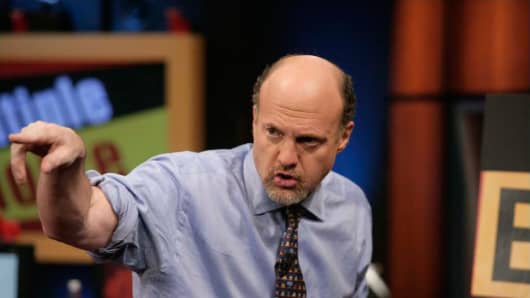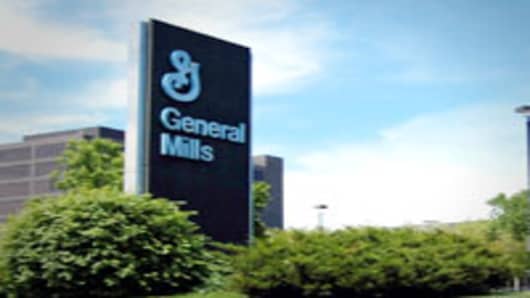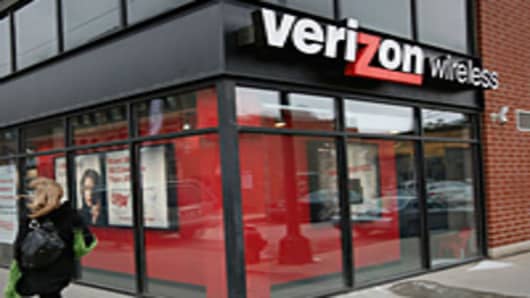In the wake of Friday’s disappointing jobs report, “Mad Money” host Jim Cramer thinks investors need to prepare for the possibility of a recession.
After all, the Labor Department said that non-farm payrolls grew by just 80,000 jobs in June, the third straight month below 100,000. Job creation was too weak to bring down the country's 8.2 percent unemployment rateand the report fueled concerns that Europe's debt crisis was shifting the U.S. economy into low gear, if not closer to a recession.
In turn, Cramer detailed a diversified portfolio of five recession-resistant stocks, which he thinks could “do far better than most if this economy keeps slowing down.”
Read on for Cramer’s 5 Recession-Resistant Stocks
General Mills (GIS)
In a recessionary environment, Cramer thinks demand for commodities could fall, thereby driving down commodity prices. So investors should look for companies that have been hurt by high commodity costs and were able to pass those costs onto the consumer. After all, Cramer said the price of commodities may fall, but the elevated prices on products are likely to stay.
To Cramer, General Mills fits the bill.
“This company has been murdered by raw costs for everything from grain to plastic,” Cramer said. “General Mills has just weathered the worst commodity cost crisis in ages and has come out much stronger than almost every other food company.”
Cramer likes that General Mills’ stock sports a juicy 3.4 percent dividend yield. Plus, General Mills recently raised its dividend payout by 8 percent, which he considers “a classic sign of confidence.” The food company has increased its dividend twelve times in eight years.
Read on for Cramer’s 5 Recession-Resistant Stocks
Dollar General (DG)
To Cramer, you can’t have a recession portfolio without a dollar store and he prefers Dollar General.
The Goodlettsville, Tenn.-based company operates more than 10,000 stores in 40 states. Cramer noted it’s only started to expand to California, though, which represents a sizable chunk of the U.S. economy.
“One of the chief reasons I like Dollar General is that I’ve never seen the stock of a company eat through not one, not two, not three, but four secondaries, or large tranches of insider stock sales and still come out ahead after every one of them,” Cramer said.
“While the dollar store theme is no longer unknown and the price to earnings multiples of the whole group have expanded rather dramatically, Dollar General still sells at only a slight premium to its growth rate and I expect that growth rate will accelerate thanks to this expansion into California along with ever-improving same-store sales.”
Read on for Cramer’s 5 Recession-Resistant Stocks
Abbott Laboratories (ABT)
Contrary to certain pop song, Cramer said breaking up is not hard to do when it unlocks value for shareholders. In other words, investors can sometimes benefit from a company’s decision to break-up.
For his recession portfolio, Cramer suggests Abbott Laboratories. In October 2011, the company announced plans to split off its pharmaceuticals business into a separate publicly traded company to increase Wall Street's focus on the remaining diversified medical product line that includes medical devices, diagnostics and nutritionals.
“This split is all about creating two stocks that each appeal to a different constituency of money managers,” Cramer said. “Abbott’s pharma biz gives you a dividend vehicle [while] the medical products biz gives you a growth vehicle and I think both components will deserve to go higher, especially in a recession where portfolio managers will pay a premium for consistency.”
Read on for Cramer’s 5 Recession-Resistant Stocks
Consolidated Edison (ED)
As avid “Mad Money” viewers know, Cramer has talked a lot lately about the need to own dividend-paying stocks with “domestic security,” meaning the underlying company has no exposure to Europe.
For his recession portfolio, Cramer suggests Consolidated Edison. The New York-based company is engaged in transmission and distribution. Cramer noted it’s not involved in power generation, though, which means the Environmental Protection Agency is less likely to crack down on them.
Cramer also likes that Consolidated Edison’s stock currently boasts a 3.9 percent dividend yield. The utility has boosted its dividend for 38 consecutive years, too.
Read on for the last of Cramer’s 5 Recession-Resistant Stocks
Verizon Communications (VZ)
Verizon Communications also made it into Cramer’s recession portfolio.
Not only does Verizon pay a 4.5 percent dividend yield, Cramer said it’s usually one of few stocks to stay up when the rest of the market is being dragged down by news regarding Europe’s debt crisis or otherwise.
“It has massive spectrum, the most up-to-date offerings and a terrific margin increase coming as it’s able to push non-Apple phones this quarter and make more per customer than if it sold iPhones,” Cramer said. “The new pricing schemes, the collapse of T-Mobile and the vast explosion of Internet consumption, all play right to into the hands of this serial dividend booster.”
Read on for Cramer's Top Dividend Stocks
—Reuters contributed to this report
When this story was published, Cramer’s charitable trust owned Abbott Laboratories, Apple and General Mills.
A previous version of this story mistated where Dollar General is headquartered, as well as how many stores it currently operates.
Call Cramer: 1-800-743-CNBC
Questions for Cramer? madmoney@cnbc.com
Questions, comments, suggestions for the Mad Money website? madcap@cnbc.com







